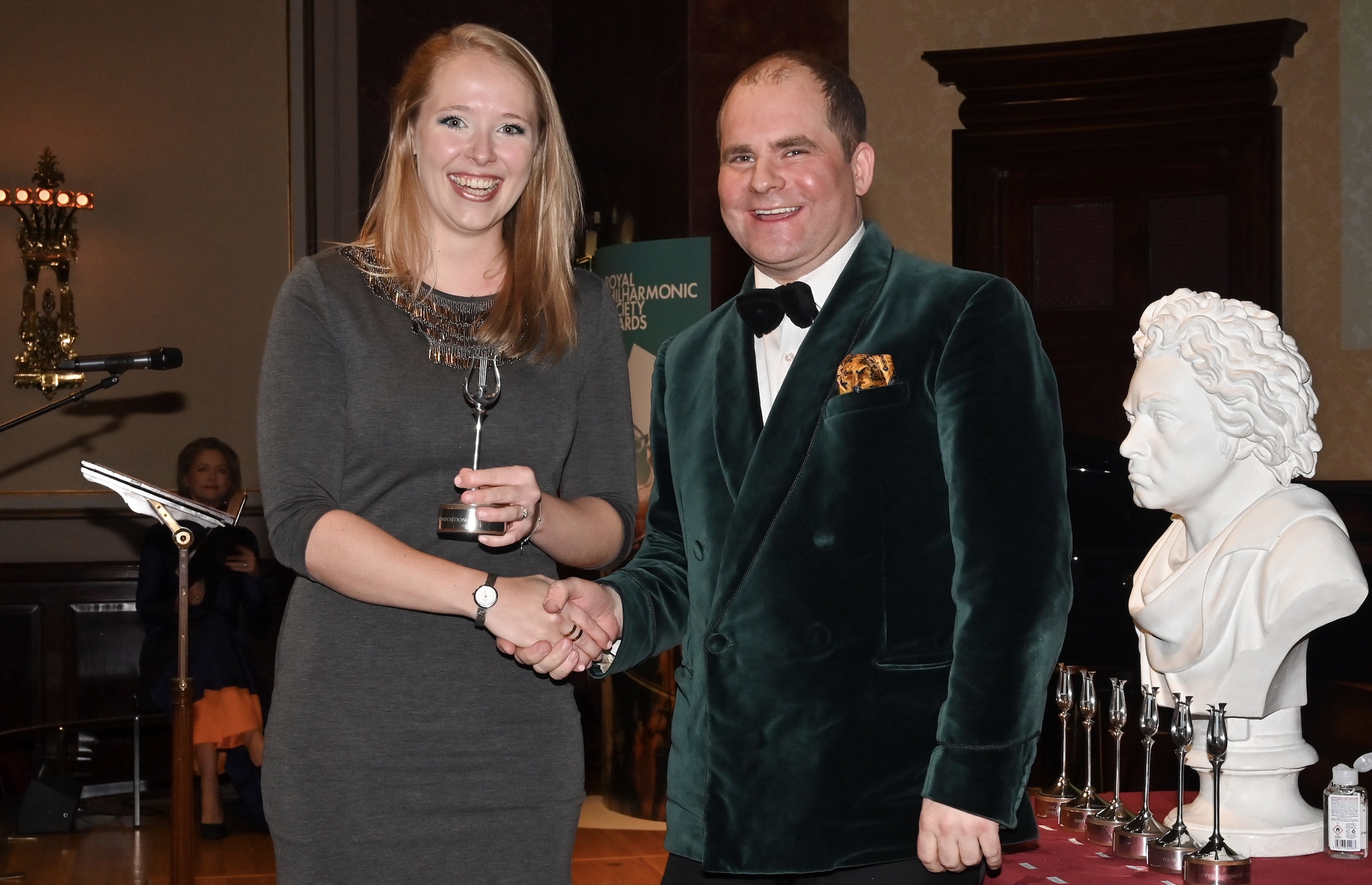People in the News
New Artist of the Month: Composer Dani Howard
 LONDON—A contemporary composer must execute a fine balancing act to command artistic respect and be popular at the same time. That’s the trick British composer Dani Howard seems to be pulling off right now with a string of commissions from the U.K.’s major orchestras. Her likable music exudes a surface brilliance shot through with flashes of minimalism, but underneath there is a compelling complexity. What’s more, her Trombone Concerto, written for soloist Peter Moore and premiered with the Royal Liverpool Philharmonic Orchestra in June 2021, has just won a coveted Royal Philharmonic Society Award. “An instant classic… lush… riveting…,” raved Richard Morrison in The Times. Pretty impressive for a 28-year-old musician who freely admits she never liked to practice.
LONDON—A contemporary composer must execute a fine balancing act to command artistic respect and be popular at the same time. That’s the trick British composer Dani Howard seems to be pulling off right now with a string of commissions from the U.K.’s major orchestras. Her likable music exudes a surface brilliance shot through with flashes of minimalism, but underneath there is a compelling complexity. What’s more, her Trombone Concerto, written for soloist Peter Moore and premiered with the Royal Liverpool Philharmonic Orchestra in June 2021, has just won a coveted Royal Philharmonic Society Award. “An instant classic… lush… riveting…,” raved Richard Morrison in The Times. Pretty impressive for a 28-year-old musician who freely admits she never liked to practice.
Howard was born and raised in Hong Kong where her father was a British police officer monitoring the handover to the Chinese. Her mother, a traveler from the U.K. and amateur clarinetist, started up a program for youngsters interested in pop music where drumkit afficionado Dani cut her compositional teeth. Music would become more than a hobby, however, when the ten-year-old started to study cello under Richard Bamping, principal cellist of the Hong Kong Philharmonic.
The idea to take composing seriously came relatively late. “I knew I had something to say, but I didn’t really like performing,” she explains. “It was a moment with my piano teacher, actually. I was doing my grade eight piece and I didn’t like these two bars, so I came back the next week and told her I’d rewritten them. She said, ‘That’s wonderful, but do that after your exam otherwise you’ll fail! But have you ever thought about composing?’”
A rough and intimidating start
Aged 18, Howard moved to the U.K. on a scholarship to study at London’s Royal College of Music under Jonathan Cole where she found herself taking her very first composition lesson. Although she now looks back on those four years as the most incredible of her life, at first things were far from easy. “I had total imposter syndrome for at least the whole of my first year,” she admits. “There were six of us in the composition department but everyone else was a performer and they were already so good. I was spending three months working on one four-minute piece for cello duo—and it not being very good. I thought, ‘Why am I here? They’ve made some kind of mistake and I’m going to be found out.’”
Worse, by Royal College of Music standards her personal style was out of fashion. “I found the whole department aggressively avantgarde,” she recalls. “The first thing my teacher said to me was, ‘I don’t write notes. I write on graph paper.’ I didn’t realize I was going to be bombarded with ‘please write a piece for a coin and a drill and a cymbal.’ It was very strange to navigate.”
Although her brand of tonal music was seriously frowned upon by her compositional peers, fortunately for Howard, other students enjoyed performing her work and Cole was “absolutely phenomenal,” she says. “He was so wise and always knew how to support me in what I was doing. I did write some really avantgarde pieces, but I remember being embarrassed sending one of those pieces home to my granddad. And I didn’t like that feeling.”
Graduating with first class honors in 2015 she got lucky early on with a commission to write an orchestral piece—in actual fact, her first—for a semi-professional ensemble. The work was called Arches, and Howard was smart enough to realize that laying out half her fee on having it recorded would give her an invaluable calling card.
Recording in hand, she went on to win an open competition to write a piece for the 25th anniversary concert of U.K. radio station Classic FM. That work, Argentum, was premiered by the Royal Liverpool Philharmonic in 2017, her first major professional gig, and the orchestra went on to ask her to write Coalescence, an opener for their 2019 season to be conducted by Vasily Petrenko.
And so it begins
The same year, British company The Opera Story debuted her first opera—Robin Hood. She also had her first London Symphony Orchestra commission performed at the Cheltenham Festival. Gates of Spring is a bubbly, gurgling curtain raiser inspired by the town’s evolution from rural backwater to à la mode spa thanks to the discovery of its health-giving mineral springs. The Trombone Concerto came soon after. By coincidence, the RLPO wanted something to follow Coalescence and only the week before Howard had been speaking with trombonist Moore, a friend of an old college housemate. Along the way, her music has also been performed by the NCPA Orchestra of China, the European Union Chamber Orchestra, and Southbank Sinfonia.
 Composer Dani Howard receives the 2021 Royal Philharmonic Society Large Scale Composition Award
Composer Dani Howard receives the 2021 Royal Philharmonic Society Large Scale Composition Award
for her Trombone Concerto from RPS President John Gilhooley at Wigmore Hall
The 2020 lockdown found her with a handy, year-long commission from the Casa Batlló in Barcelona. Her task: to compose a score for their new audio-guide, an hour of music inspired by the various spaces within the iconic Antoni Gaudí building. Writing, recording, and editing music for full symphony orchestra with members of the Berlin Philharmonic, Berlin Radio Symphony, and Deutsche Oper Berlin was a welcome opportunity to learn new skills.
This month sees her debut with the Royal Philharmonic Orchestra and in April the Trombone Concerto will receive its London premiere with the LSO. American audiences will have to wait until February 2023 when the Fort Worth Symphony Orchestra performs the U.S. premiere of Argentum.
As for the RPS win, Howard was genuinely surprised, as she believes that writing such obviously user-friendly music generally rules her out for certain things. “It is really important to me to write accessible music,” she says, citing Britten, but also Mason Bates and Nico Muhly as inspirations. “I know there’s a fine line, and I don’t want to pretend the last 100 years haven’t happened, but for me it’s about combing the two—giving people an entry point into classical music from which they can then go further.”
So far, she seems to be succeeding admirably.





 FEATURED JOBS
FEATURED JOBS

 RENT A PHOTO
RENT A PHOTO


